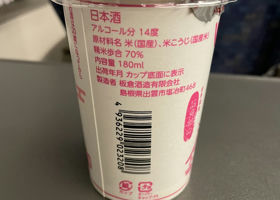



やす
I'll have it on the express train on my way home from work ✨✨.
As is, at room temperature.
The entrance is soft and sweet, with a candy-like aroma surrounded by a thick, robust acidity reminiscent of yogurt and fresh cream.
In the mouth, the rich, yet transparent mouthfeel is full of mellow umami and soft sweetness of rice, which spreads in the mouth on the acidity with a sense of body that was felt at the entrance. The finish is strong and soft acidity with just a hint of astringency.
A sake characterized by acidity to all intents and purposes.
It is still very delicious 🍶🍶.
I love this kind of moderately matured, mellow, simple junmai sake more than anything else, and it has a reassuring taste that makes me think that sake should have started from here. When I write this, I think that when I taste this kind of sake carefully, I find that the deliciousness and taste of the rice itself that emerges from the strong acidity and clear mouthfeel with a sense of body is almost the same in its framework as that of "Shinmasa" sake. It makes me wonder if it is similar to the Japanese palate that appreciates the taste of "amazu" (sweet vinegar).
It is unquestionably great at room temperature, but I regret that I can't warm it up on the express train 😆.
Japanese>English
アラジン
Good evening, Yasu-san 😃
I thought the Shimaneko cup 😸 character was the selling point, but it's amazing that it's also very well made 😳
The similarities between Niimasa and mellow junmai sake...sweet vinegar...I never really thought about it 🤔.
Japanese>English
やす
Japanese>English
やす
But I think they have something in common. Maybe I thought so even more so after having compared Shinsei at the restaurant. I'd like to pull Aladdin into the world of matured, rich, mellow sake. I want to pull him into the world of matured mellow type. That's my goal 😆😆.
Japanese>English